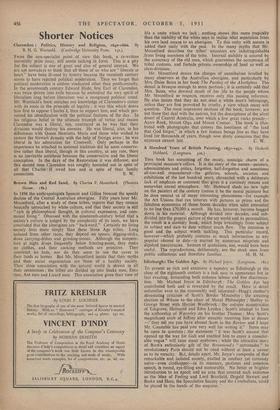Edinburgh: The Golden Age. By Michael Joyce. (Longmans. Bs.) To
present so rich and extensive a tapestry as Edinburgh at the close of the eighteenth century is a task easy in appearance 6ut in fact exacting, demanding both arduous labour and fine discrimina- tion. Mr. Michael Joyce in Edinburgh: The Golden Age hag contributed both and is rewarded by the result. Here is detail, unfamiliar even to the reasonably well informed—Hogg's mother'S • devastating criticism of Scott's Border Minstrelsy ; the amazing election of Wilson to the chair of Moral Philosophy ; Shelley. in George Street with Harriet Westbrook ; the out-size eccentricities of Eskgrove, Hermand and John Leyden ; Scott's attempt to foist the authorship of Waverley on his brother Thomas ; Mrs. Scott's. magnificent snub of Jeffrey after amiably receiving him at dinner —" they tell me you have abused Scott in the Review and I hope Mr. Constable has paid you very well for writing it." Items may be open to question ; the statement "it was Scott's success that opened up the way for Galt and enabled him to enjoy a consider- able vogue" will raise many eyebrows ; while the attractive story of Burn's enthusiastic gift of the Rosanionds " carronades " to revolutionary Paris should not be cited without at least a caveat as to its veracity. But, details apart, Mr. Joyce's composite of that remarkable and isolated society, exalted in intellect yet curiously naive—even clodhopper—in its manners, pastimes and common speech, is round, eye-filling and memorable. No better or brighter introduction to an epoch and an area that covered such extremes as the Man of Feeling and Lord Braxfleld, Dugald Stewart and Burke and Hare, the Speculative Society and the Crochallans, could ' be placed in the hands of the enquirer.'





















































 Previous page
Previous page